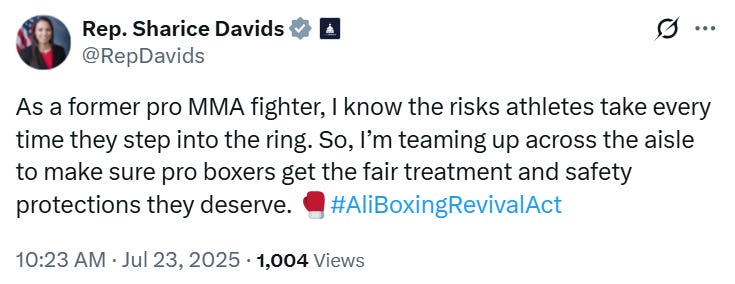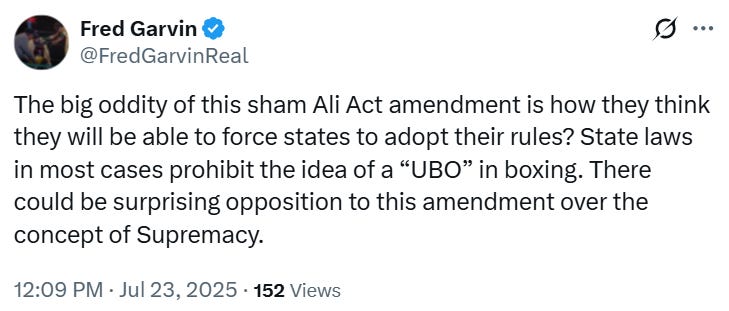TKO & UFC are ready for Congress to carve out the Ali Act
Ari Emanuel's dream boxing antitrust exemption in disguise
Mike Mazzulli of the Association of Boxing Commissions has been telegraphing this development for months.
And now, Ari Emanuel has found his two characters from central casting Congresscritters to carve out a giant exemption in the Ali Act for TKO Turki Zuffa Boxing. One sponsor, Congressman Brian Jack, is a key Trump political director, and the other sponsor, Congresswoman Sharice Davids, is a retired female MMA fighter.
The dreaded BIPARTISAN LEGISLATION tagline. Would Ari have it any other way?
Right on cue, TKO and Congress are selling the Muhammad Ali American Boxing Revival Act under two guises: safety and The Zuffa Myth.
First, here is Rep. Sharice Davids (D-KS) arguing in favor of creating mandatory minimums for boxers and promoters:
Here’s former Trump political director Rep. Brian Jack (R-GA) carrying UFC’s water by pushing a variation of The Zuffa Myth to ESPN:
Yes, “boxing is dying,” and we need “U.S. investment.” The word-smithing is off the charts here.
Let The MMA Draw smarten you up and clarify what is going on.
Ari Emanuel’s public relations campaign
It sure feels like the fix is already in. Why?
Because all of the articles you’ve read this morning in the American sports media about amending the Ali Act — under the banner of the Muhammad Ali American Boxing Revival Act — do not cite legislative text from Congress.
The proposed legislation only went online in the last hour. You can read the bill here.
What you’re digesting are talking points likely distributed from the TKO/WME Group (formerly Endeavor) media machine. This content is being regurgitated by talking heads. Like the ESPN article cited above. Like this Sports Business Journal puff piece. Like this SI Chris Mannix piece promoting the magical “bipartisan legislation” tagline.
Reportedly, TKO even managed to get an endorsement from Muhammad Ali’s widow for this amendment. What were the terms and conditions to secure this endorsement?
Patrick Stumberg at Bad Left Hook is putting the stenographer sycophants on full blast.
Now that we’ve reviewed the media machinations of the public relations machine to establish narrative control, let us decipher and analyze key parts of what we know so far.
Having their cake and eating it, too
If you don’t know the history of the Ali Act and why it matters in 2025 for boxing, please watch this video with John Nash:
Then ask yourself why TKO is concerned about the current Ali Act as constituted. The twisted logic from various actors in combat sports is that the Ali Act is a relic of the past and doesn’t apply to today’s environment. Besides, nobody enforces it anyway.
If that’s the case, then why is there such a push to change Ali Act protections?
“It doesn’t matter, but it’s a good thing that it’s getting amended.”
An antitrust exemption in disguise
Ari Emanuel, Ike Epstein, and TKO legal counsel couldn’t have imagined a better scenario playing out.
The proposed Ali Act amendment would carve out a section for sanctioning bodies called Unified Boxing Organizations.
Thanks to Erik Magraken, we now have a better sense of what the new legal definition of a UBO will be.
The term ‘unified boxing organization’ means an association, a league, or a centralized industry organization in the private sector that:
(A) organizes a professional boxing match in a system in which a boxer under contract with such association, league, or centralized industry organization competes against another such boxer pursuant to unified rules; and
(B) without reliance on a sanctioning organization operating independently of such association, league, or centralized industry organization, implements a system for title belts and ranking for boxers under contract with such association, league, or centralized industry organization.’’.
This new Ali Act amendment would, in theory, allow the creation of a Zuffa Boxing UBO. Zuffa could, hypothetically, be able to create its own sanctioning body with rankings and titles.
In practice — thanks to legislative intent — this Ali Act amendment would give TKO the green light to do as they please, when they please, in the boxing space.
But what about state laws? The inimitable Fred Garvin raises an excellent point:
There may be surprising “opposition” to UBOs on a state level, but that raises two key questions. First, who would have standing to sue? Standing is a common tactic used to avoid legal disputes. Second, what venue and causes of action would be applicable?
The obvious calculation is that no one is going to sue, and if by chance, someone does bother to sue, it will be too little, too late.
This Ali Act amendment creates certain conditions (e.g., similar to baselines established in practice under the Fair Labor Standards Act) without formally declaring TKO a monopoly with an antitrust exemption that could be wielded by a Congressperson.
About those baseline standards supposedly promised in this Ali Act amendment…
Mandatory minimums
The proposal would allow a Unified Boxing Organization to exist as long as it pays a minimum of $150 a round to a boxer. Also included are no-advanced-notice drug testing and traditional drug testing requirements, along with typical MRI and medical requirements. There is also a $25,000 insurance requirement, a requirement for two ambulances, plus three licensed doctors at ringside.
There is also an insurance provision for any UBO to provide insurance for fighters under contract during their training period.
INSURANCE POLICY.—In addition to providing health insurance under section 5(a)(4), a condition of this section is that, during the period in which a boxer is under contract with a UBO, the UBO ensures that the boxer has in effect an insurance policy that provides medical coverage for any injury sustained by the boxer during the period of training for a covered match.
But wait, there’s more. There’s an eye-popping provision that we will call the “UFC Performance Institute” clause:
‘‘(1) EQUIPMENT AND FACILITIES FOR TRAINING AND REHABILITATION.
A condition of this section is that, during the period in which a boxer is under contract with a UBO, the UBO ensures that the boxer has access to equipment and facilities that are operated by the UBO for training and rehabilitation.
How could anyone oppose this publicly? That’s the political genius behind it.
You have to admire the shamelessness of the parties involved. This is pure power politics. It’s in your face, and nobody is going to do a damn thing to stop it.
The result of this Ali Act amendment is to allow Zuffa to create its own UBO while at the same time creating additional barriers to entry for other actors.
What about club boxing?
This is where things get hairy. Pardon me for a moment, as I relive my past experiences and try to apply that knowledge to future events.
A lot of major US state athletic commissions are growing weary of club boxing events. They’re not fans of smaller events. The risk-reward proposition is simply too lopsided. The risk that a low-level boxer could get seriously hurt and not be fully covered by an insurance policy is very real. The liability issues are simply too great. Athletic Commissions frequently get sued when someone suffers permanent disability. It’s simply a numbers game. Plus, few media networks are willing to finance club boxing events. TV tax money is the lifeblood of athletic commissions. Non-TV club shows are financial stinkers for politicians.
Here’s something rarely discussed in public. Insurance policies for boxers often cover a certain time frame. If a fighter gets hurt after a certain time on the clock or they fall ill backstage after a certain time, insurance companies can fight over how much coverage applies. It’s insurance companies, after all. Having insurance for a boxer is not a be-all, end-all panacea for protection.
If Zuffa ends up vacuuming club-level events by redirecting them to the APEX warehouse in Las Vegas, it means athletic commissions face less risk of liability. Time, effort, and money.
When you increase mandatory minimums, the administrative costs go way up for club and mid-major promoters. This may not be as much of a factor in a state like New York, but it is a bigger deal in states with easier regulatory requirements.
Bottom line? The few club promoters remaining in this business will face a choice.
Quit and get out of the business altogether;
Sign up to be a satellite for a bigger player (e.g. Zuffa Boxing), or;
Attempt to continue, but with costs that are double or triple what they currently are. The risk-reward ratio for club promoters will greatly change.
This is a particularly favorable situation for a certain aspiring promoter.
Ripening conditions for a minor league monopoly
You don’t have to be a rocket scientist to see that the main beneficiary of this new Ali Act amendment is Zuffa Boxing. The legislative intent of “U.S. investment” is very clear.
Should this amendment pass, watch club promoters fade away in the same manner that private medical practices did when consolidation hit the American medical system under the Affordable Care Act. Corporations quickly swallowed up the little guys. Medical costs continue to skyrocket.
Call this the HMO-ification of boxing, if you will. Who are the big boys on the block? TKO and Turki Alalshikh.
The most likely scenario to play out?
Zuffa Boxing creates its own Unified Boxing Organization
Club promoters fade away as managers start selling their fighters to TKO
TKO obtains a new media rights deal to create their version of Dana White Contender Series
TKO dramatically expands its event calendar at the APEX warehouse in Las Vegas with boxing dates
As TKO grabs a majority share of club boxing events, they can package their control of minor league fights into a larger media rights package that can be bundled with other properties
It doesn’t get any simpler than that. Brute force process by the multi-monopoly.
The most plausible scenario? The size and scope of the boxing market will stay the same or decrease, but the actual promotional control of that pie grows exponentially under the TKO banner.
“Boxing is dying,” after all, and we need to save it by monopolizing it.
This Ali Act amendment will have the same impact on the global boxing scene that the 1996 Telecommunications Act had on local US newspapers and television stations. Under the guise of competition, the American media scene saw large consolidation. Watching local American news in 2025 is a vastly different experience. Call it the Sinclairification effect. Or the Owned-and-Operated non-Mom-and-Pop shop.
This will, in theory, funnel activity for the minor leagues to the APEX warehouse in Las Vegas. Endeavor’s Hollywood-style fight studio will control boxing’s minor leagues in a war of attrition.
The only question is which remaining boxing actors decide to sell out to TKO first before their inevitable demise. The Law of Gangster Government.
Zach Arnold is the lead opinion writer for The MMA Draw Newsletter on Substack. You can e-mail him at fightopinion - at - protonmail dot com.





Just caught up on this. Great article.
I truly applaud the attempts of journalists like you (Nate, Stephie, John, LT, BC etc.) to advocate on behalf of fighters when discussing the Ali Act and other combat sport topics.
Although I suspect some fans/fanboys will see it only as anti-TKO, it is clear to me that you are trying to change the power-imbalance and help fighters rights.
Anyways, was a great read and hugely informative.
The section about potential “barriers to entry” for others, with regards to facilities like the PI are very well observed by you.
Keep up the great work.